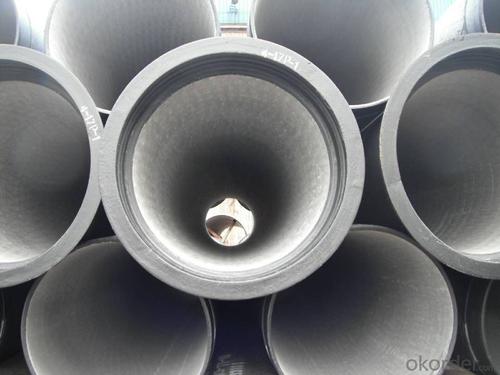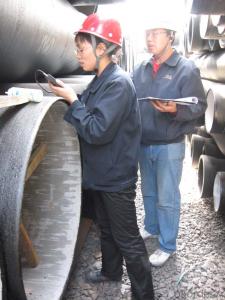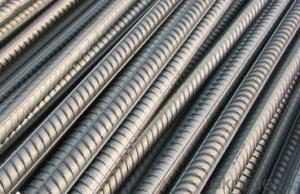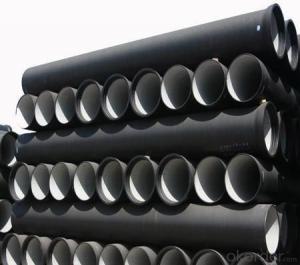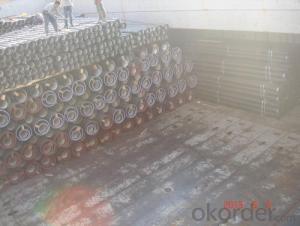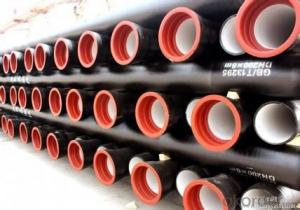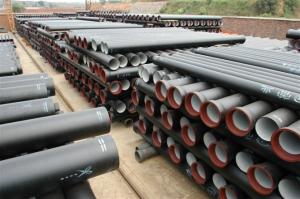DUCTILE IRON PIPE DN150
- Loading Port:
- China Main Port
- Payment Terms:
- TT OR LC
- Min Order Qty:
- -
- Supply Capability:
- -
OKorder Service Pledge
OKorder Financial Service
You Might Also Like
Specification:
1) The standard of pipe: ISO2531:1998, K9
2) Effective length: 6m
3) Inner cement line: Portland cement line as per ISO4179
4) Zinc coating: at least 130g/m2 as per ISO8179
5) Bitumen painting: at least 70um as per ISO8179
6) With 100% quantity of NBR ring, or SBR ring, or EPDM ring as per ISO4633
7) DN80mm-800mm
8) High strength, lighter than grey iron, good corrosion resistance, no furring, small flow resistance, easy fixing, long life tome about 100 yeas
9) Produced by Hangzhou chunfeng machine
10) Checked by automatic inspection equipment
11) Composition:
Chemical composition | |||
Chemical composition | Ductile Cast Iron Pipe (%) | Grey iron pipe (%) | Steel pipe (%) |
C | 3.5-4.0 | 3.2-3.8 | 0.1-0.2 |
Si | 1.9-2.6 | 1.4-2.2 | 0.15-0.4 |
Mn | 0.15-0.45 | 0.4-0.6 | 0.3-0.6 |
P | ≤0.06 | ≤0.3 | 0.02-0.03 |
S | ≤0.02 | ≤0.1 | 0.02-0.03 |
Mg | 0.03-0.06 |
|
|
12) Feature:
Mechanical properties | |||
| Ductile Cast Iron Pipe | Grey Iron Pipe | Steel Pipe |
Tensile Strength(Mpa) | ≥420 | 150-260 | ≥400 |
Yield Strength(Mpa) | ≥300 | No Confirmation | No Confirmation |
Bending Strength(Mpa) | ≥590 | 200-360 | ≥400 |
Elongation (%) | ≥10 | Neglected | ≥18 |
Brinell Hardness(HBS) | ≤230 | ≤230 | About 140 |
13) T type mechanical joint
14) Packing: in bulk or container
- Q: What is the expected burst pressure of ductile iron pipes?
- The expected burst pressure of ductile iron pipes can vary depending on various factors such as the pipe diameter, wall thickness, and the specific grade of ductile iron used. However, in general, ductile iron pipes typically have a burst pressure ranging from 350 to 700 psi (pounds per square inch).
- Q: What is the lifespan of ductile iron pipes?
- The durability and longevity of ductile iron pipes can vary depending on several factors, including pipe quality, installation conditions, and the surrounding environment. On average, these pipes typically last between 50 and 100 years, making them an excellent choice for water and sewer infrastructure. By implementing proper maintenance practices and conducting regular inspections, ductile iron pipes can remain highly functional and efficient for many decades. It should be noted that factors such as corrosion, soil conditions, and water chemistry can influence the lifespan of these pipes, so it is important to monitor and address these issues in order to extend their longevity.
- Q: Are ductile iron pipes suitable for pressure reducing valve stations?
- Ductile iron pipes prove to be suitable for pressure reducing valve stations due to their strength and durability, making them an ideal choice for applications involving high pressure. Pressure reducing valve stations, which regulate and decrease the pressure of a fluid or gas in a pipeline system, can rely on ductile iron pipes to handle the exerted pressure, ensuring an efficient and reliable operation. Moreover, the excellent resistance to corrosion exhibited by ductile iron pipes is crucial in upholding the integrity of the pipeline system, thereby preventing leaks or failures. Overall, the necessary strength, durability, and corrosion resistance required for pressure reducing valve stations are provided by ductile iron pipes.
- Q: Are ductile iron pipes resistant to acid attacks?
- Generally, ductile iron pipes exhibit resistance to acid attacks. Ductile iron, a form of cast iron which has undergone magnesium treatment to enhance its strength and ductility, produces a more durable material capable of withstanding corrosive conditions, including acids. Nevertheless, it is crucial to acknowledge that the resistance level may vary depending on the specific acid type and concentration involved. In highly corrosive environments, where powerful acids or high concentrations are present, it may be necessary to implement additional protective measures such as applying a lining or coating to the pipes. Moreover, regular inspection and maintenance are vital to ensure the long-term durability and resistance of ductile iron pipes.
- Q: Are ductile iron pipes suitable for horizontal directional drilling (HDD) installations?
- Yes, ductile iron pipes are suitable for horizontal directional drilling (HDD) installations. They possess the necessary strength and flexibility to withstand the drilling process and can be easily installed underground without compromising their structural integrity.
- Q: Can ductile iron pipe be used for water treatment plant applications?
- Ductile iron pipe is indeed applicable for water treatment plant purposes. Renowned for its robustness and endurance, this type of pipe is well-suited for the conveyance of water and other liquids in diverse industrial environments, such as water treatment facilities. Its exceptional resistance to corrosion and capacity to endure substantial pressure and temperature make it an ideal selection for scenarios where the pipe is exposed to chemicals, disinfectants, and other treatment procedures. Moreover, the installation, maintenance, and repair of ductile iron pipe are straightforward, rendering it a cost-efficient alternative for water treatment plant infrastructure.
- Q: Can ductile iron pipe be used for water treatment plant sludge handling?
- Yes, ductile iron pipe can be used for water treatment plant sludge handling. Ductile iron pipes are known for their durability, strength, and resistance to corrosion, making them suitable for handling various types of wastewater and sludge. They can efficiently transport sludge from different stages of the water treatment process within the plant without any adverse effects.
- Q: What is the expected joint deflection of ductile iron pipes?
- The expected joint deflection of ductile iron pipes depends on various factors such as the diameter of the pipe, the type of joint used, and the specific conditions of the installation. In general, ductile iron pipes are designed to accommodate some degree of deflection at the joints to allow for flexibility and movement. The American Water Works Association (AWWA) provides guidelines for the maximum allowable joint deflection for ductile iron pipes. According to AWWA C151/A21.51, the maximum deflection at the joint should typically not exceed 3 degrees or 1% of the nominal pipe diameter, whichever is greater. It is important to note that joint deflection should be within the specified limits to ensure the structural integrity and performance of the pipeline system. Excessive joint deflection can lead to leaks, failures, and reduced lifespan of the pipes. To determine the exact expected joint deflection for a specific installation, it is best to refer to the manufacturer's specifications and guidelines, as they may vary depending on the pipe size, joint type, and other factors. Consulting with a qualified engineer or contacting the manufacturer directly can provide more accurate information tailored to the specific project requirements.
- Q: Can ductile iron pipes be used for underground water treatment systems?
- Yes, ductile iron pipes can be used for underground water treatment systems. Ductile iron pipes are known for their strength and durability, making them suitable for various applications, including underground water treatment systems. These pipes are resistant to corrosion, making them ideal for transporting water, even in harsh underground environments. Additionally, ductile iron pipes have a high load-bearing capacity, allowing them to withstand the pressure and weight of the soil above. They are also versatile and can be easily installed and maintained, making them a practical choice for underground water treatment systems.
- Q: How does ductile iron pipe perform in extreme weather conditions?
- Ductile iron pipes are renowned for their exceptional performance in adverse weather conditions. These pipes demonstrate remarkable durability, resistance, and flexibility, making them suitable for enduring harsh weather such as extreme temperatures, heavy rainfall, snowfall, and even earthquakes. One of the notable characteristics of ductile iron is its capacity to withstand damage caused by freezing temperatures. Unlike other materials, ductile iron pipes possess a low coefficient of thermal expansion, enabling them to resist the expansion and contraction that occurs during freeze-thaw cycles without experiencing cracks or breaks. Consequently, these pipes remain intact and continue to function optimally even in extremely cold conditions. Furthermore, ductile iron pipes exhibit excellent resistance to corrosion, rendering them highly resilient to the corrosive effects of severe weather. They are shielded by a sturdy zinc coating, which acts as a barrier against rust and other forms of corrosion. This coating, in conjunction with the inherent strength of ductile iron, grants these pipes exceptional resistance to the corrosive effects of rain, snow, and moisture. Moreover, ductile iron pipes possess superior flexibility, allowing them to accommodate ground movement and seismic activity. In areas prone to earthquakes or soil shifting, these pipes can absorb stress and strain without fracturing, guaranteeing a continuous supply of water and sewage services even in the most challenging weather conditions. Overall, ductile iron pipes excel in extreme weather conditions due to their durability, resistance to freezing, corrosion, and flexibility. Their ability to withstand the elements ensures an uninterrupted supply of water and sewage systems, providing reliability and peace of mind to utility providers and communities, even in the most unforgiving environments.
Send your message to us
DUCTILE IRON PIPE DN150
- Loading Port:
- China Main Port
- Payment Terms:
- TT OR LC
- Min Order Qty:
- -
- Supply Capability:
- -
OKorder Service Pledge
OKorder Financial Service
Similar products
Hot products
Hot Searches
Related keywords




